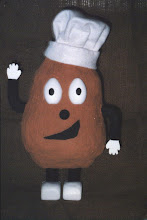I always thought I had the sense to pick friends who were half intelligent. Or half-witted at the very least. But what about those friends whom I did not choose of my own free will. There are some people who have become friends out of circumstance. For instance, I have one friend who came to visit me a few weeks ago. He brought along a friend of his with whose sister I am acquainted. We have since become friends. Also, business acquaintances count for a majority of this category. In these cases, I find I must adapt to some of the qualities that may not be the best of characteristics, and those for which my stomach may turn.
At the top of the list is an attribute that I do find interesting however irritating to say the least. Irritating, yet common enough that, if I were to base my friendship upon the presence of this trait, I would probably be ever nearing the asymptote of the function of friends. (Id est, I wouldn't have many.) That is the fact that many of my friends do not talk right. Yes, they just go on in their everyday oblivion of naiveté without a second thought about whom they might be offending or more likely, confusing. Let's visit this in more detail with examples...
"What in the world got you onto that train of thought?" you are probably asking yourself right about now. Well, I was in a rather intense discussion just the other day (yes, it really was the other day, I'm not just saying that to be funny) about something or other, when this friend mentioned that she had a "pole noodle." Interested, I stuck around. I was fascinated by what this new age invention might be. I am familiar with many of the various types of pasta around the world and their aliases. Nevertheless, I have yet to run across a pole noodle. To me, this sounded like a macaroni elbow that has been straightened. As the conversation continued, I realized that the subject was not a culinary one, and an explanation was not forthcoming. So I did the only bold thing to do...I asked, "What on Earth is a 'pole noodle'?" Her answer, to my dismay, was, "A what?"
I could see the potential for this conversation to come to a stalemate, since she seemed unaware of the term she herself had just uttered. I tried desperately again (see post below about doing the same thing over and over and expecting different results). "What is a 'pole noodle'?" Again, she said, "I said a pole noodle. Not a pole noodle." I gave her an overly-conspicuous baffled look.
"You know," she tried to explain, "those things you take with you to the pole so you can float around?"
I had to just sit there for a moment, but I finally deciphered that what she had actually been saying was "pool noodle!" In case you are wondering, the conversation did progress quite nicely and efficiently after this was clear.
The rest of the day, I couldn't help but notice how many others had been afflicted with this terrible disease. I overheard a story about someone who had been "warshing their dowg."
I wondered at that very moment only if that person had been "warshing their dowg" in their "pole."
If you have a friend or acquaintance who speaks as roughly as this in their native tongue, please comment below. It might become part of my cache of blog topics sometime in the future.
Thanks for visiting!

Here is one that I hear often because it comes out of the mouth of my beloved. He says things without adding what I consider to be necessary verbs. "The floor needs washed." "The dog needs out." Now, where I learned my English, we would say the floor needs TO BE washed and The dog needs TO GO out.
ReplyDeleteI know that we have respectfully agreed to disagree on a few points of grammar in the past, however, if you do not side with me on this one I might have to take disciplinary action. Up to and including a whack upon the side of your head with a "pole noodle."